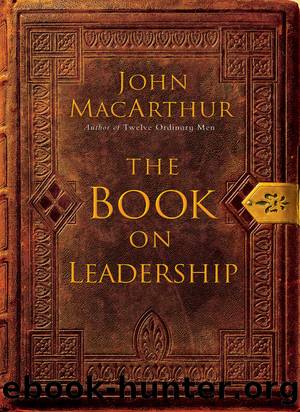The Book on Leadership by John F. MacArthur

Author:John F. MacArthur [MacArthur, John]
Language: eng
Format: epub
Publisher: Thomas Nelson
Published: 2019-02-02T00:00:00+00:00
I went down to the potterâs house, and there he was, making something at the wheel. And the vessel that he made of clay was marred in the hand of the potter; so he made it again into another vessel, as it seemed good to the potter to make. Then the word of the LORD came to me, saying: âO house of Israel, can I not do with you as this potter?â says the LORD. âLook, as the clay is in the potterâs hand, so are you in My hand, O house of Israel!â (18:3â6)
Paul borrowed the same familiar imagery in Romans 9:21: âDoes not the potter have power over the clay, from the same lump to make one vessel for honor and another for dishonor?â The clay represents fallen humanityâbase, dirty, messy, and without any inherent virtue or excellence of its own. As the divine Potter, God sovereignly molds different vessels âfrom the same lumpâ for whatever use He sees fit. Their usefulness is derived from the work of the Potter, certainly not owing to any quality in the clay.
Even the finished clay pots have no virtue or power of their own. They are simply instruments in the Potterâs hands, fashioned by Him according to His own good pleasure. Isaiah wrote, âWoe to the one who quarrels with his Makerâan earthenware vessel among the vessels of earth! Will the clay say to the potter, âWhat are you doing?ââ (Isaiah 45:9 NASB).
So Paul didnât deny his status as a lowly jar of clay; he admitted it. That was no reason to reject him, though. In fact, his lowly estate as a clay vessel was one of the credentials of his apostleship. Thus he once again turned the tables on his accusers.
All leaders are at best clay pots. Some may be better-looking pots than others. But no true leader can boast of having attained his position merely because of superior talents, physical attributes, communication skills, or whatever. If God did not use homely, ordinary clay pots, there wouldnât be any spiritual leaders at all, because there arenât any people who arenât beset with blemishes and human weaknesses.
The greatest of all leaders in Scripture were fundamentally flawed. Abraham gave in to his fears and shamefully lied (Genesis 12:13; 20:2). Moses freely acknowledged that he was âslow of speech and slow of tongueâ (Exodus 4:10). He also had repeated problems with a fiery temper (Exodus 2:11â12; Numbers 20:11â12). David committed adultery and murder (2 Samuel 11). Elijah succumbed to fear and depression (1 Kings 19:3â10). Isaiah confessed that he had a dirty mouth (Isaiah 6:5). Jonah tried to flee his prophetic commission because he hated the people to whom God called him to minister (Jonah 4:1â3). Most of the Twelve whom Christ appointed were crude fishermen. On the night of Christâs betrayal, they all âforsook Him and fledâ (Matthew 26:56). Peter, their leader and spokesman, had repeatedly embarrassed himself by saying and doing impetuous things. Then on that terrible night, he verbally denied Christ with cursing and oaths (Matthew 26:69â74).
Download
This site does not store any files on its server. We only index and link to content provided by other sites. Please contact the content providers to delete copyright contents if any and email us, we'll remove relevant links or contents immediately.
The Lost Art of Listening by Michael P. Nichols(7506)
Why I Am Not A Calvinist by Dr. Peter S. Ruckman(4153)
The Rosicrucians by Christopher McIntosh(3521)
Wicca: a guide for the solitary practitioner by Scott Cunningham(3179)
Signature in the Cell: DNA and the Evidence for Intelligent Design by Stephen C. Meyer(3138)
Real Sex by Lauren F. Winner(3024)
The Holy Spirit by Billy Graham(2953)
To Light a Sacred Flame by Silver RavenWolf(2824)
The End of Faith by Sam Harris(2742)
The Gnostic Gospels by Pagels Elaine(2532)
Waking Up by Sam Harris(2461)
Nine Parts of Desire by Geraldine Brooks(2370)
Jesus by Paul Johnson(2363)
Devil, The by Almond Philip C(2333)
The God delusion by Richard Dawkins(2309)
Heavens on Earth by Michael Shermer(2285)
Kundalini by Gopi Krishna(2185)
Chosen by God by R. C. Sproul(2165)
The Nature of Consciousness by Rupert Spira(2108)
